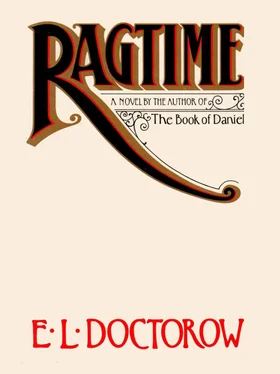Edgar Doctorow - Ragtime
Здесь есть возможность читать онлайн «Edgar Doctorow - Ragtime» весь текст электронной книги совершенно бесплатно (целиком полную версию без сокращений). В некоторых случаях можно слушать аудио, скачать через торрент в формате fb2 и присутствует краткое содержание. Жанр: Современная проза, на английском языке. Описание произведения, (предисловие) а так же отзывы посетителей доступны на портале библиотеки ЛибКат.
- Название:Ragtime
- Автор:
- Жанр:
- Год:неизвестен
- ISBN:нет данных
- Рейтинг книги:4 / 5. Голосов: 1
-
Избранное:Добавить в избранное
- Отзывы:
-
Ваша оценка:
- 80
- 1
- 2
- 3
- 4
- 5
Ragtime: краткое содержание, описание и аннотация
Предлагаем к чтению аннотацию, описание, краткое содержание или предисловие (зависит от того, что написал сам автор книги «Ragtime»). Если вы не нашли необходимую информацию о книге — напишите в комментариях, мы постараемся отыскать её.
Ragtime — читать онлайн бесплатно полную книгу (весь текст) целиком
Ниже представлен текст книги, разбитый по страницам. Система сохранения места последней прочитанной страницы, позволяет с удобством читать онлайн бесплатно книгу «Ragtime», без необходимости каждый раз заново искать на чём Вы остановились. Поставьте закладку, и сможете в любой момент перейти на страницу, на которой закончили чтение.
Интервал:
Закладка:
As for the business during Father’s absence, it seemed to have got on well. Mother could not speak crisply of such matters as unit cost, inventory and advertising. She had assumed executive responsibilities. She had made changes in certain billing procedures and contracted with four new sales agents in California and Oregon. Everything she had done stood up under his examination. He was astounded. On Mother’s bedside table was a volume entitled The Ladies’ Battle by Molly Elliot Seawell. He found also a pamphlet on the subject of family limitation and the author was Emma Goldman, the anarchist revolutionary. Down in the shop, under a translucent window, he discovered his brother-in-law hunched over a drawing table. Mother’s Younger Brother was losing his blond hair. He was pale, and thin, and more uncommunicative than ever. Most remarkable was the time he now spent at work, twelve or fifteen hours a day. He had taken for his province the fireworks division of the business and had designed dozens of new rockets, firewheels, and an unusual firecracker packed not cylindrically but in a spherical container. With its fuse looking like a stem it was named a Cherry Bomb. The two men went one morning to Younger Brother’s testing ground at the end f the trolley line, in the salt marshes. They wore heavy black coats and bowlers. Father stood on a slight rise at the edge of the tall grass. On a dried mud flat fifty yards away Younger Brother bent down and prepared his demonstration. He had arranged with Father that the first combustion would be that of the standard firecracker and the second of the cherry bomb design. He suddenly stood up, held one arm aloft and backed away a few paces. Father heard the faint pop of the firecracker after he saw a wisp of smoke erased by the wind. Younger Brother now moved forward again, bent down and backed away, this time more quickly. He held up two arms. An explosion then occurred like a bomb. Sea gulls were suddenly wheeling through the air and Father felt the after-concussion as a ringing in his ears. He was quite alarmed. When Younger Brother rejoined him, his face was flushed and his eyes glistening. Further suggested that perhaps the charge was too powerful and might do injury. I don’t want to produce something that would put a child’s eye out, Father said. Young Brother said nothing but walked back to his proving ground and lit another cherry bomb, this time standing up a bare pare or two from the fuse. He stood as if in a shower bath, his face up-turner to the water. He held out his arms. The bomb exploded. Again he bent down and again held out his arms. The bomb exploded. The birds turned in widening circles, soaring out over the Sound, swooping over whitecaps and hovering on the wind.
The young man was in mourning. Gradually Evelyn Nesbit had become indifferent to him and when he persisted in his love she had become hostile. Finally one day she had gone off with a professional ragtime dancer. She left a note. They were going to put together an act. Brother brought home to his room in New Rochelle a wooden crate filled with silhouette portraits and a pair of small beige satin shoes that Evelyn had discarded. Once, standing in nothing but these shoes and white embroidered stockings, she had placed her hands on her thighs and stared at him over the shoulder. He lay on his bed for days after his return. At times he would grab himself as if to pull his sex out by the roots. He would pace his room and hold his hands over his ears and hum loudly when he heard her voice. He could not look at the silhouettes. He wanted to pack his heart with gunpowder and blow it up. Without warning one dawn he awoke with her scent in his nostrils. This of all his memories was the most vicious. He ran downstairs and threw the stack of silhouettes and the satin shoes in the trash can. Then he shaved and went off to the flag and fireworks factory.
The silhouette portraits were recovered by his nephew.
15
The boy treasured anything discarded. He took his education peculiarly and lived an entirely secret intellectual life. He had his eye on his father’s Artic journals but would not attempt to read them unless Father no longer cared about them. In his mind the meaning of something was perceived through its neglect. He looked over the silhouettes, examining them carefully, and chose one of them to hang on the inside of his wardrobe door. It was a study of the artist’s most frequent model, a girl with hair like a helmet and the posture of someone who might run at any moment. She wore the battered high-lace shoes and sagging socks of poor children. He hid the rest of the silhouette collection in the attic. He was alert not only to discarded materials but to unexpected events and coincidences. He learned nothing at school but he did well because nothing was demanded of him. His teacher was an iron-haired woman who trained her students in declamation and clapped her hands as they practiced in their notebooks the curved lines that were thought to encourage good penmanship. At home he showed a fondness for the Motor Boys books and rarely missed an issue of Wild West Weekly , and for some reason these tastes, which the family found unexceptional, were a comfort to them. Mother suspected he was a strange child, although she shared this sense of him with no one, not even Father. Any indication that her son was ordinary heartened her. She wished he had friends. Father was still not himself and Younger Brother was too tormented by his own concerns to be of use, so it was left to Grandfather to cultivate what might be the boy’s oddity or merely his independence of spirit.
The old man was very thin and stooped, and he emitted a mildewed smell, possibly because he had few clothes and refused to buy or accept anything new. Also hid eyes were constantly watering. But he would sit in the parlor and tell the boy stories from Ovid. They were stories of people who became animals or trees or statues. They were stories of transformation. Women turned into sunflowers, spiders, bats, birds; men turned into snakes, pigs, stones and even thin air. The boy did not know he was hearing Ovid, and it would not have mattered if he had known. Grandfather’s stories proposed to him that the forms of life were volatile and that everything in the world could as easily be something else. The old man’s narrative would often drift from English to Latin without his being aware of it, as if he were reading to one of his classes of forty years before, so that it appeared nothing was immune to the principle of volatility, not even language.
The boy thought of his grandfather as a discarded treasure. He accepted the stories as images of truth, and therefore as propositions that could be tested. He found proof in his own experience of the instability of both things and people. He could look at the hairbrush on the bureau and it would sometimes slide off the edge and fall to the floor. If he raised the window in his room it might shut itself at the moment he thought the room was getting cold. He liked to go to the moving picture shows downtown at the New Rochelle Theatre on Main Street. He knew the principles of photography but saw also that moving pictures depended on the capacity of humans, animals or objects to forfeit of themselves, residues of shadow and light which they left behind. He listened with fascination to the Victrola and played the same record over and over, whatever it happened to be, as if to test the endurance of a duplicated event.
And then he took to studying himself in the mirror, perhaps expecting some change to take place before his eyes. He could not see that he was taller than he had been even a few months before, or that his hair was darkening. Mother noticed his new attention to himself and understood it as the vanity of a boy beginning to think of himself as a man. Certainly he had passed the age of sailor suits. Always discreet, she said nothing. But she was very pleased. In fact he continued the practice not from vanity but because he discovered the mirror as a means of self-duplication. He would gaze at himself until there were two selves facing one another, neither of which could claim to be the real one. The sensation was of being disembodied. He was no longer anything exact as a person. He had the dizzying feeling of separating from himself endlessly. He would entrance himself so deeply in this process that he would be unable to come out of it even though his mind was lucid. He would have to rely on some outside stimulus, a loud noise or a change in the light coming through the window, to capture his attention and make him whole again.
Читать дальшеИнтервал:
Закладка:
Похожие книги на «Ragtime»
Представляем Вашему вниманию похожие книги на «Ragtime» списком для выбора. Мы отобрали схожую по названию и смыслу литературу в надежде предоставить читателям больше вариантов отыскать новые, интересные, ещё непрочитанные произведения.
Обсуждение, отзывы о книге «Ragtime» и просто собственные мнения читателей. Оставьте ваши комментарии, напишите, что Вы думаете о произведении, его смысле или главных героях. Укажите что конкретно понравилось, а что нет, и почему Вы так считаете.












